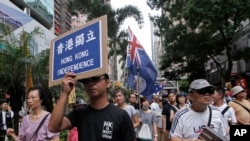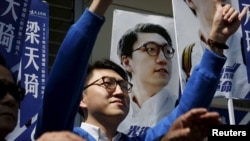Voters in Hong Kong will be electing members of the territory’s Legislative Council September 4. During past election cycles, candidates only needed to attest they would uphold the freedoms guaranteed in Hong Kong's Basic Law and pledge allegiance to the territory; this time, however, candidates running for office needed to sign an additional pledge saying Hong Kong was an inalienable part of China.
Chan Ho-tin and Yeung Ke-cheong refused to sign the pledge, which then resulted in the Hong Kong Electoral Affairs Commission banning them from the election. Edward Leung, who in the past had advocated for Hong Kong’s independence, won more than 60,000 votes in the Legislative Council during a by-election in February of this year. He also signed the new pledge proclaiming one China, but was informed this week that he was barred from participating in the election.
"It is very obvious that Hong Kong nowadays is not a place of rule of law,” said Leung. “It is a place ruled by men, ruled by the communist party. This decision is illegal but they are still doing so because they dare to do so, they dare us that we would not do anything against this authority, but that's not true. Hong Kong people will still continue to fight for our autonomy."
Leung also told reporters that “Communist China rules [Hong Kong]; every day there is the Basic Law, I won't be able to enter the Legislative Council. So what else can I do? Revolution."
VOA contacted the Electoral Affairs Commission, but it declined an interview request.
Pledge in line with Beijing objectives
“I do think that what we see, in a broader sense, with Beijing’s policy towards Hong Kong, is that in some sense [Beijing] is coming to realize what a liability even the concept of Hong Kong autonomy is to Beijing’s larger political goals,” says John Minnich, East Asia analyst for private strategic intelligence firm Stratfor.
Part of those political goals, Minnich says, came to light when Beijing detained Hong Kong booksellers through extrajudicial renditions, something he calls “extreme measures that we haven’t seen before and I think they indicate that the government [is] moving to a position where Beijing has larger political goals it’s pursuing and it’s willing to step back, or draw back, against the ‘one country two systems’ principle if it needs to in order to achieve those goals.”
David Lampton, director of China Studies at the Johns Hopkins School of Advanced International Studies, likens the pledge now required of Hong Kong candidates to the McCarthy-era pledges made in the United States - something he calls “sad times.”
Lampton says China had been trying to instill confidence in its governing practices, especially with regard to Hong Kong, Macau, and Taiwan, but he notes their latest moves are having the opposite effect.
“Since (President) Xi Jinping has come into office, there’s been a similar political tightening in the People’s Republic of China, and I think as the tolerance for dissent in China itself goes down, of course the tolerance for dissent in attached cities, such as Hong Kong, is also going down,” Lampton says.
Future implications
David Lampton is unsure where Beijing’s “tolerance” will end up, but thinks “the space for civic activity and citizen participation in meaningful governance… unfortunately that’s going down in both China and I’m afraid to say, Hong Kong.”
While there remains a lack of clarity of the impact this kind of move will have on Hong Kong, John Minnich says that this is a “concrete move toward curtailing Hong Kong’s political autonomy and the prospects for Hong Kong’s independence. This move is not a one-time event - not a one-time shot - but a node in a larger process that we see unfolding and the same basic trend going forward.”














